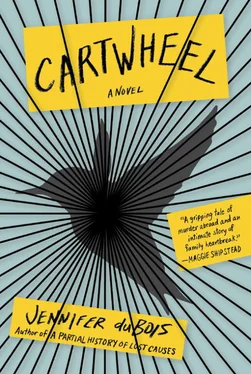“Well, at this point it’s the least they could do.”
She gave him an unbelieving look. “I mean, I just can’t believe they think I’m so dumb that I would say anything to you.”
“What?”
“They’re recording this, you realize?” she said. “They’re trying to entrap me. They think you might help them do that.”
Sebastien was not sure what his face was doing. Lily must understand that he’d lied for her, and been caught in that lie; she must understand that he had had no choice. But perhaps she loathed him for the lying anyway. Perhaps she thought he’d lied because he’d believed it was possible she had done it, or because he’d believed that other people would believe that it was possible. Perhaps she saw both of these things as betrayals. Or perhaps—and as soon as Sebastien thought of this possibility he felt its truth, like a truncheon to the soul—she really had no opinion on any of this.
“Well not, you know, intentionally,” said Lily. There was a fluttery breathiness in her voice. “I don’t mean that. I just mean they think I’ll lose my head and forget where I am and suddenly remember I did things I didn’t do.”
She was afraid to even name those things, Sebastien saw. She didn’t want to even give them a phrase, a recording of her voice stringing certain words together in a certain order, regardless of the context—such was the level of her distrust. Was this savviness (finally, belatedly)? Or just paranoia? Sebastien couldn’t tell. But either way, who could blame her? He remembered his paranoia the day he’d flown back to Buenos Aires after his parents’ death. His fear that day had not been limited to the plane ride; instead, his fear had extended nonsensically, ludicrously, both forward and backward in time, like some strange ivy that would climb toward either darkness or light. The fear had crept back into his trip’s beginnings: It was waiting for him behind a newspaper in South Station, where the clean sheets of light falling through the window always felt somehow Atlantic, oceanic, and the ashen seagulls outside made smudges against the concrete and the sky. And the fear had crept forward to the rest of the day: If the fear did not crash his plane, then it would follow him through security—after he disembarked and hailed a taxi and rode through his streets, his former streets—and into his childhood home, and into the rest of his life. The fear could be patient, after all. The fear had all the time in the world.
“Are you losing it, Lily?” said Sebastien.
There was a flash of reactionary, automatic hostility on her face that faded into pensiveness. “How would I know?” she said.
“You don’t have to worry about it,” said Sebastien. “For obvious reasons, I’m not one to judge.” He put his hand on the table, making it available for her to hold. Lily stared at it emptily, with an expression of incurious incomprehension, and made no move to take it. And suddenly Sebastien could see how Lily’s sentence would go: how her previous life would turn to red, fetal memories; how her personality would liquidate. Twenty-five years. Twenty-five years. She would become obsessed with her cigarettes, with her minor grievances and feuds. Maureen and Andrew would keep coming, though less and less, and then they would die, one after another. Anna would keep coming, twice a year, at least; she would work for two years as an i-banker (there was no way that girl wasn’t heading for an MBA, classics major or no) until she married another i-banker and they would produce two long-limbed children back-to-back. She would never give up distance running, and she would never give up sending Lily the necessaries—even as the necessaries changed, year to year, and even as there were less and less of them.
It would not matter. None of it would matter. Lily’s spirit would not be able to stop its own decay any more than her body would one day.
“I’m sorry, you know,” Sebastien said with feeling. “I’m so, so sorry.”
Lily looked at him neutrally. “For what?”
· · ·
It was two years before the appeal went to court. When the decision came, the murder conviction was overturned; the obstruction of justice conviction—resulting from Lily’s lie about the marijuana—stood, with the sentence reduced to time served. On television, Andrew Hayes said, “Two years is a lifetime at her age. It’s a lifetime.” He looked drawn and aged. “She’s already missed being an entire person she would have been. That person is dead, just like Katy Kellers.”
He got shit for the comparison, of course. Yet Eduardo thought that it probably was true—though he did not know for sure, since he had not argued the case. In fact, he had taken an extended sabbatical from the law. He went to Ravenna, Italy, to see the early Christian mosaics there, in indigo and jade. He admired the vivid simplicity of their colors, their ethics. Afterward, he walked outside and the moon above him was like a single opal in the sky.
It was possible, of course, that Lily Hayes had been innocent. Of course it was possible; anything was possible. Embracing the chance of being right was incurring the risk of being wrong. Eduardo had accepted the same stakes as the soldier, the revolutionary, the reformer. He had known that any attempt at heroism may, in retrospect, be revealed to be villainous.
He had gambled on virtue. He was at peace. He went to the karstic caves of Slovenia. He stood in ancient churches and listened for what he might hear.
Sebastien began going outside.
First, he went down to the river to think about the stars. He tilted his head back to look at the sky. He tried to see it the way Lily might see it, or the way she might have seen it once.
We all had life sentences: You spent yours inside or out, but you had to spend it somewhere.
Above him, Sebastien could almost see the slit eyes of lenticular galaxies. That sense of being observed—it was why people invented their gods. It was why he’d invented the Carrizos. And maybe this was all he’d be allowed to keep from Lily: a sense of her gaze, a slightly softer, more sympathetic one, following him through the years, her lids lowering and lowering until, finally, they closed.
He would write her a letter one day, a long time from now, when everybody else had forgotten. I still know you didn’t do it , it would say. I know that. I know that. I know .
And Lily would write back and say, I’m glad you know it. But you should also know this: I did not do it, but I might have. I did not do it, but I could have. I did not do it, but perhaps, in another lifetime, I did .
In some of its themes, Cartwheel draws inspiration from the case of Amanda Knox, the American foreign exchange student accused, convicted, and acquitted of murdering her roommate in Italy. I was fascinated by the idea of writing about a fictional character who serves as a blank slate onto which an array of interpretations—often inflected by issues of class and privilege, gender and religion, American entitlement and anti-American resentment—tend to be projected. The fictional Lily Hayes shares these broad and nebulous qualities with Amanda Knox; their similarities lie in the contradictory but confident judgments they animate in others.
The eponymous cartwheel serves as a good example of the novel’s intention, as well as its relationship to reality. In the book, some view Lily Hayes’s interrogation room gymnastics as callous, others as benign, others as suspicious. These divided perceptions were initially inspired by the response to the cartwheel Amanda Knox was widely reported to have done during her interrogation—a cartwheel that, we now know, never actually occurred. This episode, I think, illustrates some of the central questions I wanted to explore in this novel—questions about how we decide what to believe, and what to keep believing—while also demonstrating part of why I needed a totally fictional realm to do this.
Читать дальше












